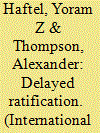|
|
|
Sort Order |
|
|
|
Items / Page
|
|
|
|
|
|
|
| Srl | Item |
| 1 |
ID:
120166


|
|
|
|
|
| Publication |
2013.
|
| Summary/Abstract |
Some treaties are signed and then ratified quickly while others languish in legal limbo, unratified by one or more parties. What explains this variation in the time between signature and ratification? The international relations literature has not taken the ratification stage seriously enough, despite its obvious importance from a legal and a political perspective. We offer a systematic study of this question in the context of bilateral investment treaties. We develop and test a set of theoretical propositions related to domestic-level constraints on the executive, the varying ability of governments to rationally anticipate ratification obstacles, and the bilateral relationship between treaty partners. We generally find support for these propositions but report some surprising findings as well. The article presents implications for investment agreements and treaty making more generally, and raises a number of issues for further study at the intersection of international politics and law.
|
|
|
|
|
|
|
|
|
|
|
|
|
|
|
|
| 2 |
ID:
117527


|
|
|
|
|
| Publication |
2012.
|
| Summary/Abstract |
While delegation to international organizations has received substantial attention in the international relations literature, the issues of institutional choice and delegation levels remain understudied. Existing research examines donor countries' decision to distribute aid bilaterally or turn to a multilateral organization; this article shifts the focus toward a closely related, but often overlooked, decision that donors need to make-that is, they select an agent from a range of international organizations and determine the level of delegation to a given agent. I argue that in their delegation decisions, donors are guided not only by standard calculations of delegation costs and benefits, but also by policies that international development agencies adopt and implement. These policies are shaped by member governments' preferences, and a donor country will delegate more to the organizations whose members have foreign policy preferences more in line with the donor country's own preferences, ceteris paribus. The article presents a set of empirical tests that lend support to this argument. Cross-country data on European development aid given during the period 1960-2000 are used in the analyses.
|
|
|
|
|
|
|
|
|
|
|
|
|
|
|
|
| 3 |
ID:
118161


|
|
|
|
|
| Publication |
2012.
|
| Summary/Abstract |
What counts as evidence that the other side is sincere? Within mainstream international relations literature, scholars have focused on costly signals. We argue, however, that in the real world leaders do not simply look at costly signals, but they rely to an important extent on their personal impressions of other leaders, taking these as credible indicators of sincerity. Our approach thus builds both upon the literature on interstate communication and perceptions and upon more recent research in the field of neuroscience regarding affective information. To probe the plausibility of our theory, we focus on the indicators British Prime Minister Neville Chamberlain used to evaluate Germany sincerity in the late 1930s and Ronald Reagan employed to make sincerity judgments about Soviet intentions in the late 1980s. Additionally, we briefly discuss the 1961 Vienna Summit between Kennedy and Khrushchev as an illustration of how personal impressions can also result in negative assessments of sincerity. Our findings suggest that personal impressions are an important, but up until now relatively ignored, source of evidence for leaders of their counterparts' sincerity with significant implications for threat assessments and policy choices.
|
|
|
|
|
|
|
|
|
|
|
|
|
|
|
|
| 4 |
ID:
116866


|
|
|
|
|
| Publication |
2012.
|
| Summary/Abstract |
State death, understood as the formal loss of control over foreign policy, is an important but neglected issue in the international relations literature. When do states die and why? How do states exit the system? The consequences of state death can be wide-ranging, from forced migration movements, regional instability, to general famine. Despite these severe consequences, political scientists have yet to adequately study the causes of state death. Fazal finds that states are prone to death when they are located as a buffer between two rivals; this suggests that being a buffer state is a cause of state death. Our expansion of current research seeks to add the concept of territorial disputes to the state death literature. We suggest that states are at greater risk of death when they become involved in territorial disputes that raise the stakes of conflict. The resulting research demonstrates that a reliable predictor of state death is engagement in a territorial dispute. Territorial disputes are the most prevalent issue that leads to war and can also be a leading cause of state death.
|
|
|
|
|
|
|
|
|
|
|
|
|
|
|
|
|
|
|
|
|